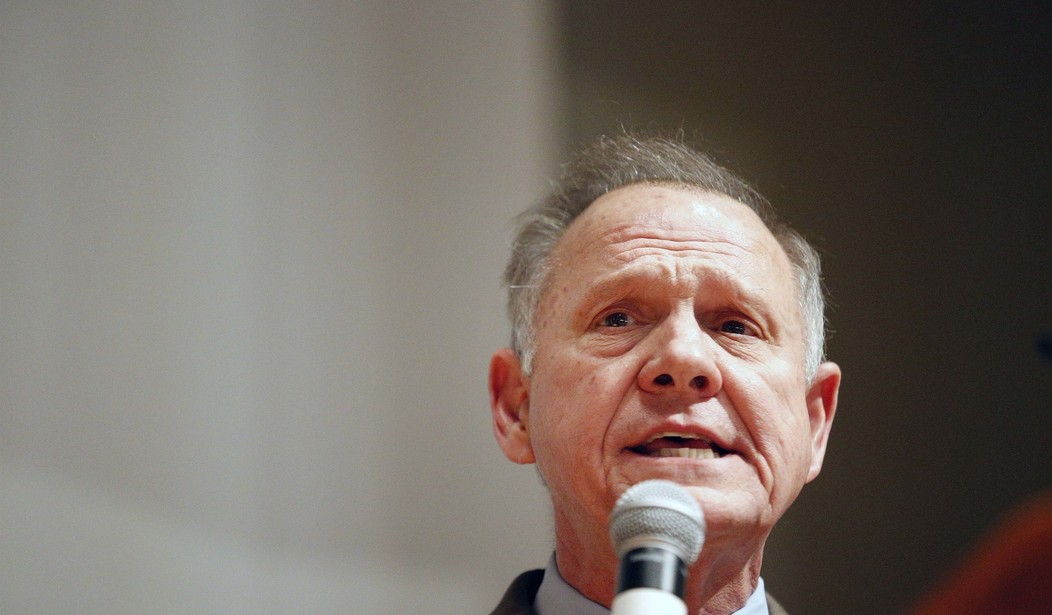Turnout would be the key to which of the wildly conflicting polls would best presage the result of Alabama's special Senate election, wrote Republican consultant Patrick Ruffini earlier this week.
That proved correct. Statewide, turnout was down 37 percent from November 2016. It was down less, 31 percent, in the five metropolitan counties around Birmingham, Huntsville, Montgomery and Mobile, with their black communities and most of the state's highly educated whites.
Turnout was down by even less, 28 percent, in the 10 rural counties where the majority of voters are black. But it plunged 42 percent in the remaining 52 small counties. As the returns came in, you could see Republican Roy Moore reaching his target percentages -- but not the raw votes he needed. Donald Trump carried those counties by 568,000 votes. Moore did so by only 149,000.
So Democrat Doug Jones, with big majorities in the metropolitan (61 percent) and black-majority (76 percent) counties, beat Moore by a 50-48 percent margin in a state that has voted 60 to 62 percent Republican in the past four presidential elections.
Moore was a problematic candidate from the outset. He was twice ousted as chief justice of the Alabama Supreme Court for disobeying federal court orders, in violation of the supremacy clause in Article 6 of the Constitution. He also argued that Muslims cannot take the oath of office, in violation of Article 6's ban on religious tests for office. In 2012, he was elected chief justice with 52 percent of the vote, far behind Mitt Romney's 61 percent.
Recommended
Moore might still have won but for The Washington Post's scrupulously vetted Nov. 9 story reporting that in his 30s, he dated teenage girls and sexually molested a 14-year-old. Moore's denials were ham-handed and unpersuasive.
The majority of Alabama voters are evangelical Christians. Many white evangelicals were clearly sickened by the charges and stayed home, voted for Jones or, like the state's senior senator, Richard Shelby, wrote in someone else. Black evangelicals streamed into the polls in large numbers.
Liberal commentators like to chide white evangelicals by noting that many heavily white evangelical areas have high rates of divorce and unmarried births. The same could be said of black evangelicals. Nonetheless, many such voters lament breaches of traditional morality and seek candidates who uphold their higher, though often violated, standards.
There are multiple losers from the Alabama result. One is Sen. Al Franken of Minnesota, who promised to resign in "coming weeks" while denying misconduct far short of that alleged against Moore. Minnesota's governor has announced his replacement, and Franken will surely be gone soon.
Gone also are Democrats' hopes of capitalizing on what would have been an inevitable Senate Ethics Committee investigation of Moore and a probable vote to expel him from the Senate. Mainstream media, which carefully avoided coverage of the bribery trial of Democratic Sen. Bob Menendez, would have joined gleefully in portraying Moore as the face of the Republican Party.
Republicans are losers, as well. Their Senate majority is reduced to only 51-49, so Majority Leader Mitch McConnell can afford to lose only one colleague on partisan roll calls. Democrats' chances of winning a Senate majority next year increase, though perhaps not to the 50-50 level some claim. They need wins in marginal Nevada and Arizona, and their chances of saving their 10 incumbents in states carried by Trump -- five by wide margins -- look better.
But the biggest loser is surely Breitbart News leader and former Trump aide Steve Bannon. He has been operating under the delusion that as a private citizen, he can spark a national rebellion aimed at somehow removing McConnell as majority leader. Now it's clear that the only possible replacement is Democrat Chuck Schumer.
Bannon campaigned actively for Moore, who would probably have won the nomination even without his help, while Trump endorsed appointed incumbent Luther Strange. Given Jones' small margin, it's obvious that Strange or Rep. Mo Brooks, who finished third in the primary, would have won Tuesday.
Jones deserves credit for a flawless campaign, but his example of taking ultraliberal positions on abortion and immigration may lead Democrats to nominate similar candidates in races against less problematic Republicans. And would Jones have beaten Moore if the Senate had been 50-50 and his win would have led to Democratic control?
Jones' victory depended on multiple Republican mistakes, enumerated in an amusing tweetstorm by The New York Times' Alexander Burns, much as a lock picker depends on getting every tumbler to fall into place. The result is consequential but won't be easy to replicate.

























Join the conversation as a VIP Member